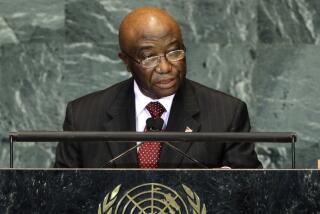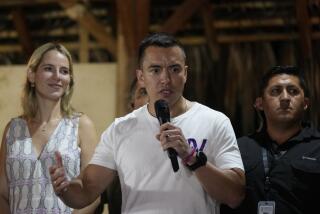Nigerians Give Hero’s Welcome to Presidential Hopeful
- Share via
IBADAN, Nigeria — Thunderous cheers erupted from the sea of sun-drunk supporters who waved banners and beat drums as the man favored to win Nigeria’s presidential election this weekend climbed the stairs to the podium Thursday.
“Power! Power!” the crowd chanted as Olusegun Obasanjo punched his fists in the air and members of his People’s Democratic Party surged forward in an attempt to embrace him.
The candidate’s rapturous reception was a sign of this country’s fledgling moves toward democracy: The vote Saturday will give Africa’s most populous nation its first freely elected civilian president in 15 years.
Critics charge that the campaign process has not been free and fair, and that Obasanjo, a onetime general who ruled Nigeria in the 1970s, has been preordained to win by the outgoing military regime of Gen. Abdulsalami Abubakar.
But analysts said that no matter the outcome, Nigerians need to view their next leader’s four-year tenure as a necessary first step in a lengthy transition to democracy.
There are no clear ideological differences between Obasanjo, 61, and his rival, former Finance Minister Olu Falae, 60, who is running on a joint ticket for the All People’s Party and the Alliance for Democracy.
Both candidates are from the ethnic Yoruba southwest, which has felt excluded from the political process since 1993 elections were annulled just as the late local tycoon, Moshood Abiola, was poised to win. And both have running mates from the Hausa-speaking north.
Money, however, has given Obasanjo an edge over Falae.
Questions have been raised about where the retired general acquired huge funds so soon after spending three years in jail for allegedly plotting a coup against late dictator Gen. Sani Abacha.
Many Nigerians, and outsiders, are disturbed by Obasanjo’s reported ties to former military ruler Gen. Ibrahim Babangida, blamed by many for the country’s political instability and economic ruin.
Nicknamed the “Kingmaker” and reportedly one of the country’s richest generals, Babangida is widely believed to be Obasanjo’s prime financial backer. Babangida is also known to have strong ties to Falae, who was a minister in his government.
Considered a master of manipulation, Babangida is strongly disliked by many Nigerians.
“To the common man, he is the devil incarnate, or the Nigerian version of the antichrist, the diabolical precursor to the biblical Armageddon,” senior correspondent Ademola Adegbamigbe recently wrote in the News, a popular magazine. “The military, his constituency, see him as another Don Corleone, the ever-generous but scheming protagonist of Mario Puzo’s ‘The Godfather.’ ”
Babangida, whose regime was marred by widespread theft of the country’s oil wealth, three times postponed a promised hand-over to a democratically elected government.
Then, in 1993, he annulled elections, sentencing Nigeria to years of stasis and vicious repression under Abacha.
In a recent hourlong interview in the drab northern city of Kaduna, Babangida denied bankrolling Obasanjo’s presidential campaign, although he acknowledged that he wants him to win.
“I contributed with prayers and good wishes,” he said, adding that Obasanjo was suitable for the job because he is “a leader who has a very vast experience in what the country stands for . . . a leader who can do business with the international community” and a leader who has been “tested.”
“In post-military Nigeria, maybe [Obasanjo] is the best we can have at this time,” Babangida said. “He understands the system. He knows the military. He can instill a lot of confidence and hope in the military.”
Many seem ready to accept Obasanjo as their new leader.
“Obasanjo has been tested,” said Alhaji Haruna Bidmus, a state coordinator for the candidate’s party. “Since he left office, we have had nothing better. Because of his [army] background, we think he will serve as a bridge between the civilians and the military.”
Victoria George, a civil servant from Nigeria’s east, agreed.
“He has reached out to people beyond his own people,” she said.
At a recent fund-raising event in the nation’s capital, Abuja, hundreds of party faithful obediently tolerated a three-hour delay to the start of the event. But the delay did not stem the flow of donations: The People’s Democratic Party raked in about $3.4 million.
“By the grace of God, what needs to be done, will be done,” Obasanjo told the smartly dressed, doting audience made up of the country’s elite. “This transition program is ordained by God. . . . I appeal to the people of Nigeria to give us a landslide mandate.”
Critics believe that Obasanjo is already guaranteed the nation’s top job.
Among the complaints are the fact that the so-called Independent National Electoral Commission was selected by the current regime, made up of former Abacha cronies; the use of controversial electoral rules that were established under the Babangida and Abacha regimes; and the decision to force parties to register nationally to be eligible to participate in local state elections.
“The whole thing is flawed,” said J. F. Ade Ajayi, professor emeritus of history at the University of Ibadan. “You cannot have the military midwifing a democratic process, because they won’t allow it.”
But analysts noted that Nigerians need not despair as long as their new leader understands that he is part of an ongoing process and not a permanent fixture.
More to Read
Sign up for Essential California
The most important California stories and recommendations in your inbox every morning.
You may occasionally receive promotional content from the Los Angeles Times.














